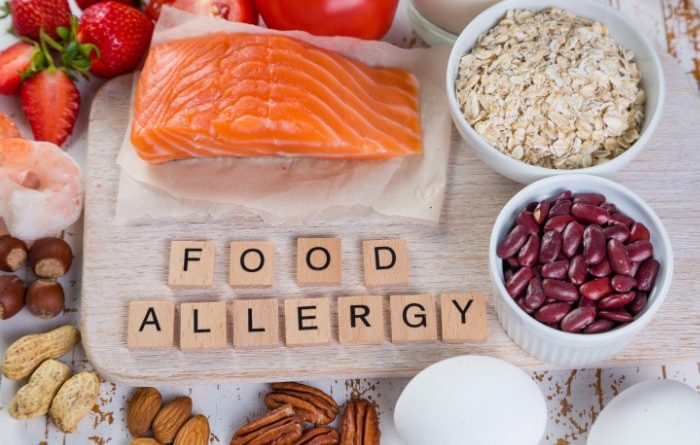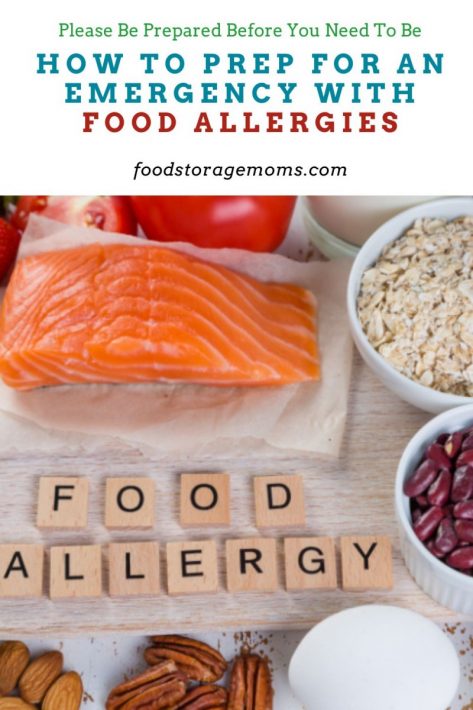By Linda Loosli

If you have allergies, prepping for an emergency situation is a little bit different than it is for someone without allergies. I know several people who have food allergies and I get asked all the time how they should try to prepare for an emergency. The truth is, it’s a lot more work to prep for someone with allergies than for someone without allergies, however, it’s worth doing the work now so you’re prepared later. You’ll want to check out these tips for how to prep for an emergency with food allergies. Stay tuned to FoodAllergy.org for up-to-date information on this topic.
Items I Recommend:
- Ball Pint-Size Wide-Mouth Mason Jars
- FoodSaver
- FoodSaver Jar Sealer Accessory Hose
- Dehydrator
- Emergency Washing Unit

What are food allergies?
A food allergy is when your body has a reaction to a certain food or group of foods. This can happen right after you eat the food, or it may take a few hours for the symptoms to start. Symptoms of a food allergy can range from mild (such as hives or itching) to severe (such as trouble breathing or swelling in the throat).
The Top Food Allergies
The first step in prepping for an emergency when you have allergies is to know what your allergies are. The most common food allergies are peanuts, tree nuts, milk, eggs, soy, wheat, fish, and shellfish.
If you are allergic to any of these foods, it is important to make sure that you always have safe options available for you in case of an emergency. That means keeping safe, allergen-free food with you at all times, and knowing where you can find safe food in an emergency situation.
Allergy Action Plan for an Emergency with Food Allergies
If you have allergies, it is also important to create an allergy action plan. This is a plan that outlines what you should do in case of an allergy attack.
Your allergy action plan should include information such as a list of your allergies, what symptoms to look for, what to do if you have a reaction, and who to contact in an emergency. You should also keep your allergy action plan with you at all times so you can reference it in an emergency. It is particularly helpful to be able to pass this information to your health care provider when asked, it could save you lots of grief, and possibly your life. Why You Need Emergency Contact Information
Stocking Up on Allergen-Free Food
In an emergency situation, you may not be able to find safe, allergen-free food if the stores you rely on are closed, or they have run out of the foods you need. That is why it’s important to stock up on allergen-free food ahead of time.
There are many allergen-free food options available, so you should have no trouble finding food that is safe for you to eat. Some allergen-free food options include:
You can also find allergen-free versions of many common foods, such as allergen-free bread, allergen-free crackers, and allergen-free cereal.
When stocking up on allergen-free food, be sure to check the expiration dates and rotate your food regularly, just like you would your regular food storage items. You should also keep your allergen-free food in a cool, dry place, or in the fridge or freezer if directed by the supplier.
Does the Red Cross give allergen-safe foods?
If you are staying in a Red Cross shelter, they will have allergen-safe foods available for you. However, make sure you have a small emergency supply ready because it can take a while for them to have the allergin-friendly meals ready. Be sure to let them know your allergies when you check in so that they can accommodate you.
What if I need my medication?
Be sure to pack enough of your medication(s) to last for at least a week in your personal emergency kit. You may also want to consider getting an extra prescription filled and keeping it in a safe place! 35 OTC Medications You Should Store
Companies That Sell Allergy-Friendly Prepared Food Kits
Being prepared for an emergency is always a good idea, but it is especially important if you have allergies. There are many companies that sell allergy-friendly food kits so you can be sure to have safe, allergen-free food when it’s needed most.
Some companies that sell allergy-friendly food kits include:
Mountain House
Mountain House is a company that sells allergy-friendly food kits. They offer pre-made meals that are free of peanuts, tree nuts, milk, eggs, soy, wheat, fish, and shellfish.
Valley Food Storage
Valley Food Storage is another company that sells allergy-friendly food kits. They offer a variety of allergen-free food options, including freeze-dried and dehydrated foods.
Larabar
Larabar is a company that sells allergen-free food bars. Their bars are free of peanuts, tree nuts, milk, eggs, soy, wheat, fish, and shellfish.
Make Your Very Own Allergy Friendly Food Kits
You can also make your own allergy-friendly food kits. This is a great option if you want to be sure that you have safe, allergen-free food in an emergency situation, but you don’t want to spend a lot of money. How to Properly Store Food for Long-Term Storage
Dehydrate Safe Foods For Long Lasting Storage
One way to make your own allergy-friendly food kit(s) is to dehydrate safe foods. This is a great option because it allows you to store food for a long period of time without the need for refrigeration. Several Ways To Dehydrate Food
Some foods that can be safely dehydrated include:
You can dehydrate foods using a dehydrator or the sun. If you are going to use the sun, make sure that you put the food in a place where it will not be exposed to animals or insects.
Freeze Dry Allergy Friendly Foods
Another option for making your own allergy-friendly food kit is to freeze-dry foods. This is also a great option because it allows you to store food for a long period of time without the need for refrigeration. 5 Freeze-Dried Food Items I Recommend You Store
Canning Allergy Friendly Foods
Canning is another option for making your own allergy-friendly food kit. This is a great option because it is a time-tested way to prepare the foods you need for a long period of time without the need for refrigeration. Home Canning-Important Do’s and Don’ts
Some foods that can be safely canned include:
- Fruits
- Vegetables
- Meats
- Soups
- Stews
There are two methods of canning: water bath canning and pressure canning. Water bath canning is the simplest method and can be used for high-acid foods, such as fruits and tomatoes. Pressure canning is a more complex method, but it can be used for low-acid foods, such as vegetables and meats.
Final Word
When it comes to being prepared for an emergency, it is especially important if you have allergies. There are many companies that sell allergy-friendly food kits so you can be sure to have safe, allergen-free food in an emergency situation. You can also make your own allergy-friendly food kit(s) by dehydrating or freezing foods. Canning is another option for making your own allergy-friendly food kit(s). Whatever you decide, don’t get overwhelmed, you can do this.
If you have allergies and have put together a quality food storage plan to support that effort, please let me know and I’ll pass your ideas on to my readers. May God Bless this world, Linda
Copyright Images: Food Allergies AdobeStock_155822302 by anaumenko
No comments:
Post a Comment